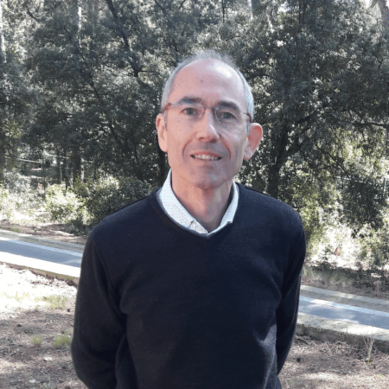
Carles Escera Micó
Jefe de Grupo Senior
Research group
Research line:
Coding speech sounds in newborns: the potential for frequency monitoring as a biomarker for neurocognitive development
Carles Escera graduated in Psychology in 1987 and joined the UB as assistant professor in 1988 to achieve his PhD in 1993.
He has worked as postdoctoral research at the University of Helsinki (Finland) in 1993, 1994, 1996 and 1999, and was a visiting professor at the University of Bremen (Germany) and the Hanse Wissenschasftskolleg in Delmenhorst (Germany) in 2004 and 2005.
Carles Escera is professor of Cognitive Neuroscience at the Department of Clinical Psychology and Psychobiology, Faculty of Psychology, University of Barcelona, former director of its Institute of Neuroscience (2015-2017) and guarantor researcher of the María de Maeztu Excellence Unit awarded to this institute in 2017.
He is also coordinator of the Generalitat de Catalunya Consolidated Research Group (SGR) in Cognitive Neuroscience.
He has participated in the organization of more than 15 international congresses in Cognitive Neuroscience and Psychophysiology, and has given lectures in universities worldwide (USA, Japan, Singapore, UK, Germany, Canada). He has been the principal investigator of more than 30 research projects, including one from the Consolider-Ingenio 2010 program, and several from the Framework Programs if EU (FP4, FP5, FP7), and the coordinator of an ERANET.NEURON project from EU and a Marie Slodowska-Curie action of FP7. He is currently involved in an ERC Advanced-Grant in Archaeology (ARTSOUNDSCAPES) as the leader of two workpackages (psychoacoustics and neuroscience).
He is author of more than 120 papers of high impact, including journals such a Nature Communications, Proceedings of the National Academy of Science, Brain, Cerebral Cortex o Journal of Neuroscience. Dr. Escera has received the ICREA Acadèmia award in the 2010 and 2015 calls.
His research interests are addressed towards the understanding the mysteries of the mind by deciphering the mechanisms of brain function, including those of attention, auditory perception, musical processing, and emotion, and how these mechanisms are disrupted in neurodevelopment and mental disorders such as autism, dyslexia, attention deficit disorder or schizophrenia. The approach of his research group is based on the recording of the human electroencephalogram (EEG) to analyze event-related brain potentials and oscillatory activity. This approach is complemented with magnetoencephalography (MEG), functional magnetic resonance (fMRI) and genetic analysis. At present, the Escera's research is driven by the idea that even deep structures within the brain, such as the auditory midbrain, play a critical role in auditory cognition, contributing to speech, music and rhythm perception.
Professional network profiles
Related websites
Last Publications
- Balen SA, de Souza Evangelista CK, Ribas-Prats T, Santos AB, Arenillas-Alcón S and Escera C Frequency-Following Response in Infants With Congenital Syphilis. JOURNAL OF SPEECH LANGUAGE AND HEARING RESEARCH . 69(1): 1-13.
- Jacxsens L, Gorina N, Mondéjar-Segovia A, Arenillas-Alcón S, Biot L, Cardon E, Van Rompaey V, De Hertogh W, Lammers MJW and Escera C Toward the Optimal Stimulus to Elicit the Frequency-Following Response. EAR AND HEARING . : .
- Jacxsens L, Biot L, Vandenbroeke T, Cardon E, Van Rompaey V, De Hertogh W, Escera C and Lammers MJW Disrupted fundamental frequency encoding in sensorineural hearing loss revealed by the frequency-following response HEARING RESEARCH . 467: 109426-109426.
News
-
Fetuses experiencing restricted fetal growth exhibit less development in crucial brain structures
A study conducted by the Institut de Recerca Sant Joan de Déu - SJD Barcelona Children's Hospital reveals that small fetuses diagnosed with late-onset growth restriction show a decrease in the length of specific brain structures compared to fetuses with appropriate size for their gestational age. The findings have been published in the scientific journal Ultrasound in obstetrics & gynecology.
-
Benefits of listening to music during pregnancy on baby's brain capacity for language sound encoding
The study, led by Dr. Carles Escera · Institut de Recerca Sant Joan de Déu, shows that when pregnant women sing to their baby or listen to music with speakers every day during gestation, babies are born with a better ability for neuronal encoding of language sounds.
-
Artificial intelligence tool to predict neurodevelopmental progress of infants with low birth weight
Dr Carles Escera receives support from the Bosch i Gimpera Foundation to develop the project Artificial intelligence tool to predict neurodevelopmental progress of infants with low birth weight.
More activities
-
Defensa tesi doctoral: Marta Puertollano Rodríguez
Sala de Graus Facultat Psicologia · UB · Campus Mundet
-
Defensa tesi doctoral: Sonia Arenillas-Alcón
Sala Miquel Siguan de la Facultat de Psicologia de la Universitat de Barcelona (Campus Mundet)
-
Pint of Science |Entendiendo el cerebro en desarrollo: del embarazo a los primeros meses de vida
La Iguana, Carrer de Rosés, 46 08028, Barcelona

 Universitat de Barcelona
Universitat de Barcelona